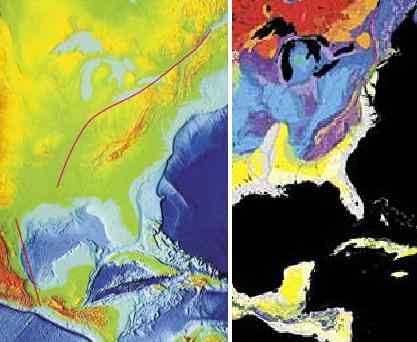New Madrid confusion
I know the Zetas have said that before the New Madrid earthquake, the area will be experiencing a series of progressively larger quakes. Currently they are in the 4.0 range. I have noticed the past year they have gotten stronger little by little. Zetas say they will go from 4-5 range to 6-7 before the large quakes hit. My question is, with the USGS adjusting down the magnitudes and sensitivity of the monitoring equipment, will we ever see 6.0 - 7.0 quakes reported or will we just have to guess magnitude by damage assessment. [and from another] http://www.news9.com/story/27368575/kansas-quake-48-shakes-up-resid... A large earthquake that originated in Kansas was felt by residents across Oklahoma. The 4.8 magnitude temblor rumbled at 3:40 p.m., eight miles to the south of Conway Springs, Kansas, or about 124 miles north of the Oklahoma City metro, at a depth of three miles. Several viewers called and wrote in to News 9 reporting to have felt the quake, some even as far south as Norman, Okla. So far there have been no reports of damage or injuries related to this earthquake. [and from another] http://science.blurtit.com/98027/what-is-the-richter-scale 1 to 8 on the Richter Scale, the effects are these: 1 - quake detectable only by seismographic measurement; 2 - hanging objects swing slightly and a few people might feel the tremor; 3 - people indoors feel some vibrations; 4 - buildings tremble and glassware breaks; 5 - furniture overturns and pictures fall from walls; 6 masonry cracks, some houses cave in, windows break and chimneys fall; 7 extensive damage to dams, dikes and bridges, with many buildings collapsing; 8 - all structures receive catastrophic damage. [and from another]http://eqseis.geosc.psu.edu/~cammon/HTML/Classes/IntroQuakes/Notes/... To complete the construction of the magnitude scale, Richter had to establish a reference value and identify the rate at which the peak amplitudes decrease with distance from an earthquake. He established a reference value for earthquake magnitude when he defined the magnitude as the base-ten logarithm of the maximum ground motion (in micrometers) recorded on a Wood-Anderson short-period seismometer one hundred kilometers from the earthquake. [and from another] http://en.wikipedia.org/wiki/Richter_magnitude_scale The following describes the typical effects of earthquakes of various magnitudes near the epicenter. The values are typical only and should be taken with extreme caution, since intensity and thus ground effects depend not only on the magnitude, but also on the distance to the epicenter, the depth of the earthquake's focus beneath the epicenter, the location of the epicenter and geological conditions (certain terrains can amplify seismic signals). 4.0–4.9 Noticeable shaking of indoor objects and rattling noises. Felt by most people in the affected area. Slightly felt outside.
Indeed, as we have recently confirmed, the USGS continues to downgrade magnitude to the point where at present quakes can be listed at almost two points below their actual magnitude. Magnitude includes scope as well as jolt force, so often this can be ascertained by the area affected. In the case of a recent 4.8 quake in Kansas, which was strongly felt 170 miles away in Oklahoma, the magnitude is questionable. When the epicenter is not in a populated area games can be played. Another clue to the actual magnitude is the damage done by the quake. Note in our early 2011 prediction that we stressed that the New Madrid adjustment quakes would be those running up along the New Madrid fault line, not general stress caused by the bowing on the N American Continent. Watch for damage to buildings and infrastructure along the course of the New Madrid fault line, the slippage along the fault line itself, and use this as a guide to the magnitude of the quakes involved.
SEARCH PS Ning or Zetatalk
https://poleshift.ning.com/forum/topics/last-trimester-event-timeline
NEW POLE SHIFT UPDATE!
Nancy Lieder November 11, 2025 ZetaTalk Chat for November 30, 2025 - Earth Changes and the Pole Shift
Nancy Lieder, Emissary of the Zetas.
https://poleshift.ning.com/xn/detail/3863141:Comment:1168188
Awakening to the Alien Presence ZetaTalk
The truth will likely never to be known to the public but be washed away in the Nibiru panic soon to engulf the world.
The Worst of the Cover-Up
https://poleshift.ning.com/profiles/blogs/the-worst-of-the-cover-up
Main Establishment Lies
https://poleshift.ning.com/profiles/blogs/main-establishment-lies
Donate
© 2026 Created by 0nin2migqvl32.
Powered by
![]()


You need to be a member of Earth Changes and the Pole Shift to add comments!
Join Earth Changes and the Pole Shift